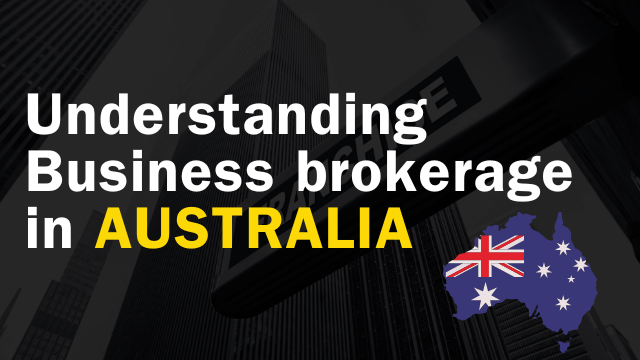
Table of Contents
Business brokerage plays a crucial role in Australia’s dynamic economic landscape. As a facilitator of business sales and acquisitions, a business broker is an invaluable resource for both buyers and sellers. If you’re considering buying or selling a business, understanding the role and services of a business broker can significantly enhance your chances of a successful transaction.
What is a Business Broker?
A business broker is a professional who assists in the buying and selling of small to medium-sized businesses. They offer various services, including business valuation, marketing, negotiating deals, and guiding clients through the legal and financial intricacies of the transaction. Their goal is to ensure a smooth and efficient process, maximising value for their clients.
The Role of Business Brokers in Australia
In Australia, business brokers are essential for several reasons:
1. Market Knowledge:
Business brokers possess extensive knowledge of local market conditions, industry trends, and economic factors that can influence business transactions. This expertise allows them to provide valuable insights and advice to their clients.
2. Business Valuation:
One of the critical services provided by business brokers is business valuation. Accurately valuing a business is a complex task that requires a deep understanding of financial statements, market conditions, and industry benchmarks. Brokers use their expertise to determine a fair and realistic price for the business.
3. Confidentiality:
Maintaining confidentiality during the sale process is crucial to prevent business operations disruptions and protect sensitive information. Business brokers implement strategies to keep the transaction discreet while reaching potential buyers.
4. Marketing and Advertising:
Business brokers have access to a wide network of potential buyers and use various marketing channels to advertise the business for sale. They create comprehensive marketing plans that highlight the business’s strengths and attract serious buyers.
5. Negotiation Skills:
Negotiating the terms of a business sale can take time and effort. Business brokers act as intermediaries, ensuring that both parties reach a mutually beneficial agreement. Their negotiation skills help in resolving disputes and closing deals efficiently.
6. Legal and Financial Guidance:
The legal and financial aspects of buying or selling a business can be intricate. Business brokers guide their clients through the process, ensuring compliance with legal requirements and facilitating smooth financial transactions.
1. Initial Consultation
The process begins with an initial consultation where the broker understands the client’s needs and objectives. This meeting helps the broker gather essential information about the business and its potential value.
2. Business Valuation
The broker conducts a thorough business valuation, analyzing financial statements, market conditions, and industry trends to determine a fair price for the business. According to a report by BizBuySell, the median sale price of small businesses in Australia increased by 6.1% in 2023, reflecting the growing demand and market confidence.
3. Marketing Strategy
A customized marketing strategy is developed to reach potential buyers. This may include listing the business on various platforms, creating promotional materials, and leveraging the broker’s network. For example, AN Global consulting uses targeted online marketing and industry connections to maximize exposure for their clients’ businesses.
4. Screening Buyers
Business brokers screen potential buyers to ensure they are financially capable and genuinely interested in purchasing the business. This step helps in identifying serious buyers and avoiding time-wasters.
5. Negotiations
The broker facilitates negotiations between the buyer and seller, striving to reach a mutually agreeable deal. They handle offers, counteroffers, and any disputes that may arise during the process.
6. Due Diligence
Once an offer is accepted, the due diligence process begins. The broker assists in gathering and reviewing necessary documents, ensuring that all legal and financial aspects are in order. According to a survey by IBISWorld, 72% of successful business sales in Australia involved thorough due diligence facilitated by a broker.
7. Closing the Deal
The final step involves closing the deal, where the broker coordinates with legal and financial professionals to complete the transaction. They ensure all paperwork is signed, and the transfer of ownership is smooth.
Benefits of Using a Business Broker
– Expertise and Experience:
Business brokers bring years of experience and specialized knowledge to the table, increasing the likelihood of a successful transaction.
– Time-Saving:
Managing a business sale can be time-consuming. Brokers handle the process, allowing business owners to focus on their daily operations.
– Access to Buyers:
Brokers have access to a vast network of potential buyers, increasing the chances of finding the right match for the business.
– Higher Sale Price:
With their negotiation skills and market knowledge, brokers often secure higher sale prices for businesses.
Statistics on Business Brokerage in Australia
– Growth in Business Sales: According to the Australian Bureau of Statistics, the number of small businesses sold in Australia increased by 8% in 2023, reflecting a robust market for business transactions.
– Broker-Assisted Sales: A report by the Business Brokers Association of Australia (BBAA) revealed that 65% of small business sales in Australia were facilitated by business brokers, underscoring their importance in the market.
– Sale Price Premiums: Data from BizBuySell indicated that businesses sold with the assistance of brokers achieved sale prices 12% higher on average compared to those sold without broker involvement.
When selecting a business broker, consider the following factors:
1. Experience and Track Record:
Look for brokers with a proven track record and extensive experience in your industry. AN Global consulting, for example, has a team of seasoned professionals with a history of successful transactions.
2. Client Testimonials:
Check for client testimonials and case studies that demonstrate the broker’s ability to deliver results. Positive feedback from previous clients is a strong indicator of the broker’s reliability and effectiveness.
3. Services Offered:
Ensure the broker offers comprehensive services, including business valuation, marketing, negotiation, and legal support. A full-service broker can manage the entire process, providing peace of mind to clients.
4. Professional Associations:
Membership in professional associations, such as the Business Brokers Association of Australia (BBAA), indicates a commitment to industry standards and ethical practices.
The business brokerage industry, traditionally reliant on interpersonal relationships and paperwork, is undergoing a significant transformation. Technological advancements and shifting economic landscapes are reshaping the way businesses are bought and sold. Here’s a look at what the future holds for business brokerage in Australia.
The Impact of Technology
Technology is revolutionizing the business brokerage industry. Tools like artificial intelligence, virtual reality, and big data analytics are transforming how brokers operate.
- AI-Powered Valuation:
Advanced algorithms can analyze vast amounts of data to provide more accurate and efficient business valuations. This can help brokers and clients make informed decisions.
- Virtual Business Tours:
Virtual reality technology can offer potential buyers immersive experiences of businesses without physical visits, saving time and resources.
- Data-Driven Insights:
Data analytics can help brokers identify market trends, potential buyers, and optimal pricing strategies.
Changing Business Landscape
The Australian business landscape is also evolving, influencing the role of business brokers.
- Small Business Boom:
The rise of small and medium-sized enterprises (SMEs) is creating a growing market for business brokerage.
- E-commerce and Online Businesses:
The increasing number of online businesses will require specialized brokerage services to cater to their unique characteristics.
- Industry Consolidation:
Consolidation within industries may lead to more complex business transactions, necessitating brokers with specialized knowledge.
The Role of the Modern Business Broker
As the industry evolves, business brokers will need to adapt their skill sets.
- Digital Proficiency:
Brokers will need to be comfortable with technology and able to leverage digital tools effectively.
- Data Analysis:
Understanding data analytics will be essential for making informed recommendations to clients.
- Specialized Knowledge:
Developing expertise in specific industries or business models can provide a competitive advantage.
- Client Relationship Management:
Building strong relationships with clients will remain crucial, even in a digital age.
Challenges and Opportunities
While the future of business brokerage is promising, there are challenges to overcome.
- Regulatory Changes:
The industry may face new regulations, requiring brokers to stay updated on compliance requirements.
- Cybersecurity:
Protecting sensitive business information will be a top priority as more transactions move online.
- Competition:
Increased competition from new entrants and technological disruptions could impact the industry.
However, these challenges also present opportunities. By embracing technology, staying informed about market trends, and building strong client relationships, business brokers can thrive in the evolving landscape.
The future of business brokerage in Australia is bright. By adapting to technological advancements and understanding the changing business environment, brokers can position themselves as invaluable partners for buyers and sellers. As the industry continues to evolve, those who embrace innovation and prioritize client needs will be best positioned for success.
Conclusion – The Path Ahead
As Australia’s business landscape continues to evolve, the role of business brokers becomes increasingly vital. Their expertise, market insights, and ability to navigate complex transactions make them indispensable allies for both buyers and sellers. Whether you are looking to enter the market, expand your portfolio, or exit a business, leveraging the skills and knowledge of a seasoned business broker can significantly enhance your chances of success. In an environment where precision, discretion, and strategic planning are paramount, a business broker’s guidance can be the key to unlocking new opportunities and ensuring a smooth and profitable transaction.


